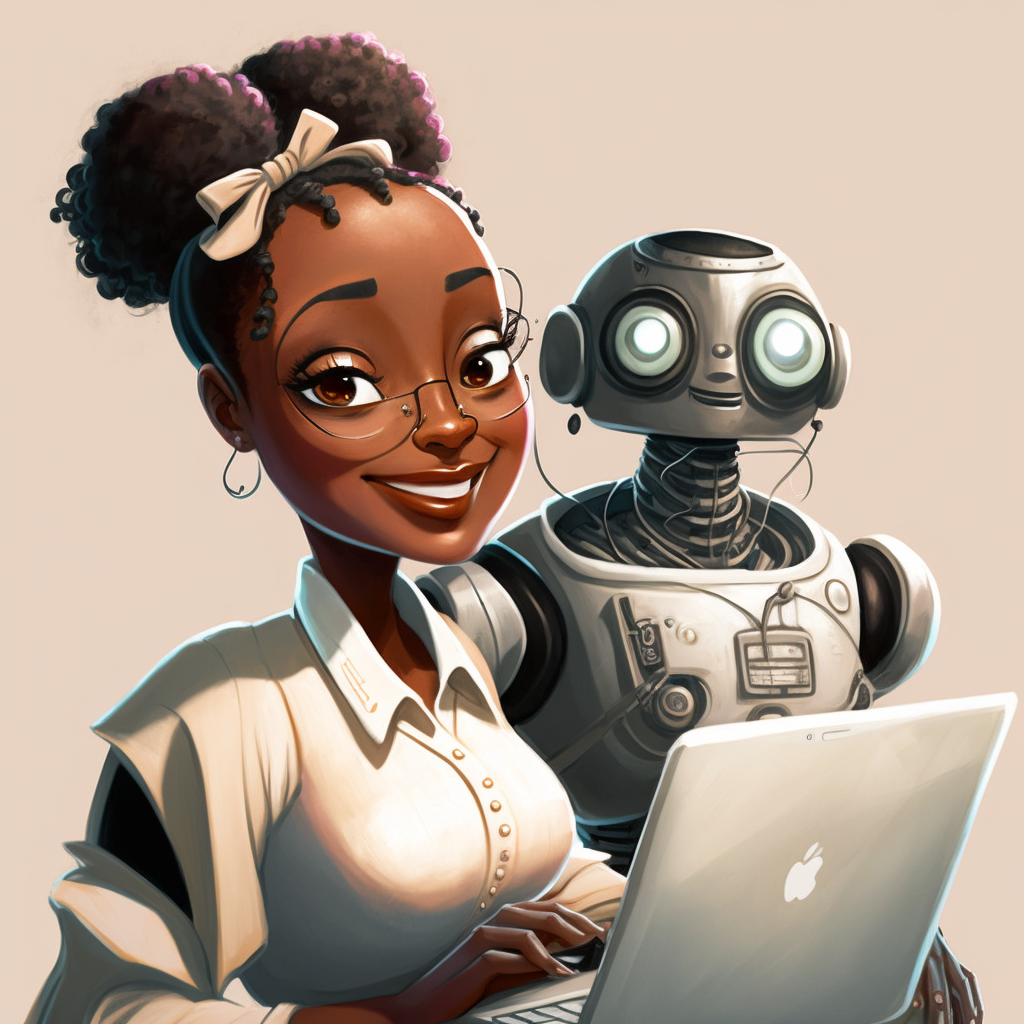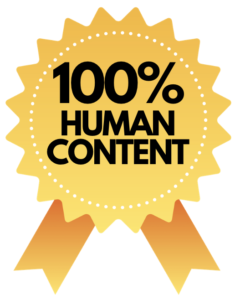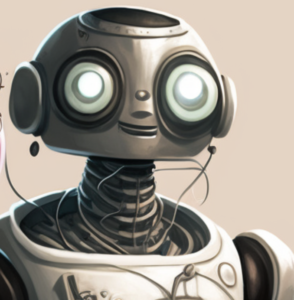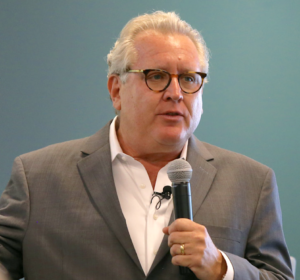
The other day a friend told me how she was planning to fight the encroachment of artificial intelligence tools replacing writing, graphic design, and other human creator skills. “It’s taking the heart and soul out of our work,” she proclaimed. “This is nothing less than an existential crisis presented by AI.”
 It took me an hour to talk her off her cliff.
It took me an hour to talk her off her cliff.
But perhaps you’re feeling some of this anxiety and sadness, too. I’ve thought about this a lot. HUMAN skills are being effortlessly replaced by AI. If you’re a creator, you’d have to be a sponge-like creature at the bottom of the Mariana Trench NOT to have an emotional reaction to what’s going in.
So let me share some calming thoughts with you today. Yes, there is an existential crisis presented by AI. Let’s deal with it in a rational and productive way and come out stronger on the other side. Today I will put our challenge in the context of three lessons … and provide a solution at the end.
Lesson one: The story of the calculator.
I’m old enough to remember the profound controversy that erupted when low-cost personal calculators became adopted in the 1980s. Suddenly, any person could solve complex math problems, even if they were terrible at math.
The educational system was the first battleground for this new threat. Teachers asked questions like:
- Is it fair to let students use this technology on homework? In the classroom? On tests?
- If we assign a project, how will we know if students are “cheating” by using the calculator?
- Do students still need to learn math?
Those questions probably sound familiar because they are the same questions posed about technologies like ChatGPT and DALL-E today.
So what happened with the calculators? They took over the math scene.
- Everyone became a competent mathematician.
- Calculating technology has become integrated into our daily lives. We don’t even need calculators. The math is done for us on websites and spreadsheets.
- In a way, calculators became a second brain for us. Instead of math, we could spend that time doing something more productive. I haven’t done long-form math to solve a problem in more than 20 years. I am perfectly happy with that.
Lesson one: Content-generating AI is here to stay … and it’s going to become exponentially better. It’s incredibly useful. It’s already being integrated into everything. You have no choice but to embrace it and use it to your advantage.
Lesson two: An industry disrupted.
When ChatGPT was released, I immediately called my friend Shelly Palmer, an acclaimed tech analyst.
I published our discussion as a podcast episode and blog post, and he explained how this development paralleled disruption in the music industry. Before 1986, recording music required a band, singers, and perhaps an orchestra. Within a year of the advent of digital music production, half of all professional musicians lost their jobs.
“People claim this AI development isn’t like that,” he said. “No, it’s EXACTLY like that. This will replace a lot of content creator jobs.”
But there’s also a lesson about personal survival here.
In Shelly’s example, the “commodity” studio musicians lost their jobs. But the most-respected songwriters, producers, and technicians thrived. So did the elite musicians whose improvisational talent and technical acuity were always in demand.
If you’re providing “information” in your job, you will probably be replaced. If you’re providing valuable “insight” and improvisation like those star musicians, you’ll still have a bright future.
Information loses. Insights win.
Lesson three: Everybody writes. Literally.
I recently reviewed Ann Handley’s wonderful new edition of her book “Everybody Writes.” Ann launched this just days before ChatGPT took over the world (two million subscribers in 10 days!). She probably had no idea that with AI, literally everybody writes!
Just as the calculator made everybody competent at math, artificial intelligence makes everybody competent — perhaps even excellent — at writing, art, and video production. One friend posted online: “I don’t have a creative bone in my body. Now I’m creating fantastic art.” He is selling his art as an NFT collection.
Similarly, a busy friend who never had time to write now finds her thoughts are being expressed beautifully through ChatGPT in mere seconds. “I am going to write a blog post every day!” she said. “I’m going to write a book!”
Creativity has been unleashed everywhere. This is life-changing stuff.
And then … there is me. I worked for decades to become an excellent writer. I was a journalism major, a communications professional, a blogger since 2009, an author of 10 books. I put in the work to be an effective and respected writer.
Then came the shock of my career: I asked ChatGPT to write a specific essay that would have been appropriate for my new book Belonging to the Brand, complete with academic references. And, oh yeah, write it in the voice of Mark Schaefer.
The darn thing did it. It did it very well. In five seconds.
I felt depressed thinking about the months I spent writing that new book. While the bot could not have come up with the vision and insights that form the book’s thesis, and it can’t pepper the narrative with meaningful childhood stories, ChatGPT could have done much of the heavy lifting and saved me weeks of time — weeks of my life!
Sure, people will find dumb AI mistakes, create funny posts about it, and we’ll all have a laugh. They probably laughed about the first cars and telephones, too. But let’s not lose sight that ChatGPT is damn near miraculous in its ability to create effective content (and so much more!)
We need to be intellectually honest, swallow our pride, use this tool boldly, and then leverage the new time savings to build new greatness for our businesses.
While there is an existential crisis presented by AI to professional writers like me, I’m not too worried. There is hope for you and me …
This is what saves us.
As far as I can tell, there are three strategies to help us survive the existential crisis presented by AI.
1. The personal brand is everything.
For nearly a decade, I’ve been screaming from the rooftops that you need to be working on your personal brand.
I’m not worried about my place in the changing world because I have an emotional connection with you. You read this blog because you presumably know me, trust me, and like my ideas. Some of you have been reading this blog for more than a decade and will continue to do so no matter what happens with our robotic overlords.
My personal brand will save me. It will save you too. In fact, I think it is the ONLY thing that can protect you in an environment where important life skills are commoditized.
If you have not taken your personal brand seriously, you must. As you may know, I have a popular course that can get you started in the right direction. It’s the best course of its kind anywhere:

2. Pivot now.
I talked to a guy the other day trying to start a new career as a corporate blogger. In fact, he spent quite a bit of time and $10,000 on some course promising to teach him how to become a professional blogger (whatever that is). He is unknown in his profession and has no special expertise.
I gave him a demonstration of ChatGPT by creating a post on a topic of his choice — in five seconds. Of course he was amazed. I then had to explain to him that he was probably unemployable. That was really, really hard to do. I’ve never said those words to anybody before in my life.
His next question was, “but where can I get a job?”
He’s not accepting reality. He needs to pivot into something else. Maybe you do, too.
Even if this fellow is an excellent writer, most companies don’t need excellent writers. They need Google-sufficient writers. ChatGPT is Google-sufficient.
I know, I know. Corporate storytelling, epic content, and blah blah blah. Sure, we need some of that. But 95 percent of corporate content is simply Google-sufficient.
I urge you to have a clear-eyed view of what is happening. If you think the emerging AI tools will not impact your career (for better or worse), you’re wrong. Learn enough to know what you need to do next.
A resource to help you would be the book Cumulative Advantage, which discusses strategies to become newly relevant against all odds.
3. Own it.
I’m guessing there were thousands of people in calculator denial in the 1980s. They embarked on a Sisyphean struggle to hold the line on long-form math. Resistance was futile. Or, maybe it’s still happening on a Reddit thread somewhere!
 The point is, the people and institutions that integrated mathematical automation into their business were so far ahead of the resisters.
The point is, the people and institutions that integrated mathematical automation into their business were so far ahead of the resisters.
For the first time, AI has poked its head out of secretive laboratories and made a home in our lives. It’s fun and easy. With a little practice and creativity, you can develop exciting new ideas. I talked a lot about writing in this post, but ChatGPT can help unclog marketing bottlenecks in customer service, research, data analysis, engagement, and planning, to name a few areas.
Resource that can help — This site catalogs unexpected and amazing uses of ChatGPT. You’ll learn something new here and maybe reimagine how you create content and tackle everyday marketing tasks!
And here is a very short and basic tutorial on Dall-E image generation.
BTW, the image at the top of the post today was created using the prompt: “friendly robot helping a smiling black woman who is working on a laptop computer, style of disney.”
I really like the image on this post and AI has helped me make this content more fun and interesting for you. In 10 seconds!
![]()
Final thoughts: The existential crisis presented by AI
I do not have all the answers to the existential crisis presented by AI. I have a feeling this is going to be a topic on this blog for a long time. As always, I may not be an expert, but I will take you along on my learning journey.
You might have noticed a new tag I used on the blog today that says “100% Human Content.” I’m trying it out as an assurance that everything on this blog was written by me. If I use AI, I will be transparent about it. I’ll eventually integrate AI content into my work (taking my own medicine!) once I get over the guilt of employing a machine to do my work.
 Mark Schaefer is the executive director of Schaefer Marketing Solutions. He is the author of some of the world’s bestselling digital marketing books and is an acclaimed keynote speaker, college educator, and business consultant. The Marketing Companion podcast is among the top business podcasts in the world. Contact Mark to have him speak at your company event or conference soon.
Mark Schaefer is the executive director of Schaefer Marketing Solutions. He is the author of some of the world’s bestselling digital marketing books and is an acclaimed keynote speaker, college educator, and business consultant. The Marketing Companion podcast is among the top business podcasts in the world. Contact Mark to have him speak at your company event or conference soon.
Follow Mark on Twitter, LinkedIn, YouTube, and Instagram.
Illustration generated by MidJourney


